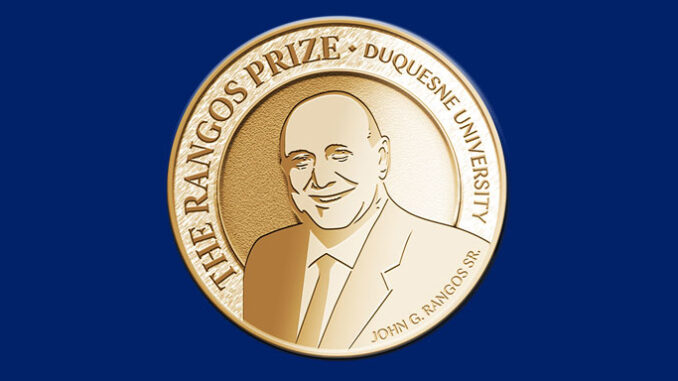
Sovi Herring | Staff Writer
Nov. 3, 2022
As the 2023 Rangos Prize deadline of Dec. 9 gets closer, students are encouraged to begin learning about the requirements to have the best chance at developing a useful proposal.
The Rangos Prize began with John G Rangos Sr., founder of the Congressional Medal of Honor Foundation, veteran of the Korean Conflict and an instrumental member of Duquesne University’s success, according to Duquesne’s website. His efforts to impact the environmental industry, health and various other efforts led him to philanthropy on a wide scale. His doubled-down efforts after a long career to better the world led to things such as funding the DU Rangos School of Health Sciences and Anna Rizakus Endowed Chair in Health Science—named in honor of his late mother.
Through his drive to improve matters, he donated to campus to promote others’ ideas to make campus surroundings better.
The Rangos Prize strives to continue his drive to promote ideas that can improve campus for students.
“It’s a competition for faculty and students to propose innovations to enhance learning for current and future generations of students,” said Steven Hansen, Duquesne’s director of the Center for Teaching Excellence.
According to Hansen, the competition begins with “creative solutions that can make a difference” through submitting “proposals that can include new courses, course materials, pedagogical approaches and academic initiatives that address challenges and issues facing today’s students.”
There are two rounds before students can be named awardees for the Rangos Prize.
“Applicants selected from the first round are invited to participate in a second round of competition that involves making a public pitch of their idea in the spring semester,” Hansen said. “The Center for Teaching Excellence offers consultations, drop-in clinics and pitch preparation workshops to assist applicants through both rounds of competition. Past recipients have received a John G. Rangos Sr. medallion and prize money for implementing their innovative ideas.”
Rangos Prize 2021 and 2022 Winner Jessica Schmitz, a senior political science and economics major, wanted to create a course that would focus on the impact of social media and how it affects politics.
“I started developing a new course in the Political Science and Communication & Rhetorical Studies departments that would explore the nexus between social media, politics and communication,” Schmitz said. “For political science majors, there isn’t a course that highlights how essential social media is to politics, and I thought we needed one.”
Schmitz found out about the prize competition through the DU email blast—something she highly recommends checking thoroughly. In her endeavor, she found that an obstacle for this dream was funding for a faculty member to utilize the course.
“The Rangos Prize would’ve aided my ability to pay for that faculty member,” Schmitz said. “The Rangos prize is more than just money, but I think it can really help the students.
Schmitz took her winning proposal from 2021 and applied in the next category as a returning applicant in 2022 where she had to continue working on her course.
“I had to submit all course documents (syllabus, rubrics, etc.), research, and a written and video proposal to continue the program’s funding to further impact another generation of students, which is ultimately what I want the course to do.” Schmitz said.
New applicants for 2023 and previous year’s winners from student and faculty bodies are encouraged to learn more through the Provost and the Center for Teaching Excellence and apply. These projects can impact the campus for multiple years and thousands of students that pass through in that time.
Schmitz believes that a team mentality, faculty support and a mindset for success helped move along in the process.
“Work with others,” Schmitz said. “If you have an idea but need help preparing and implementing it, the Center for Teaching Excellence assistants has workshops on how to draft proposals and what the Rangos project is.”
Throughout November, the initial learning and drafting period, many development opportunities are available to help any prospective applications. The initial proposals to help make the campus better are due Dec. 9.
Requirements for applications, proposals and reporting can be found on the Rangos Prize webpage on the campus website.
The finalists will be announced in the spring, according to Hansen. From there, the finalists will prepare for the pitch competition followed by a year to begin implementing their Rangos Prize into campus. Students receive a medallion for their effort and, possibly, prize money to help fund their project if needed.
